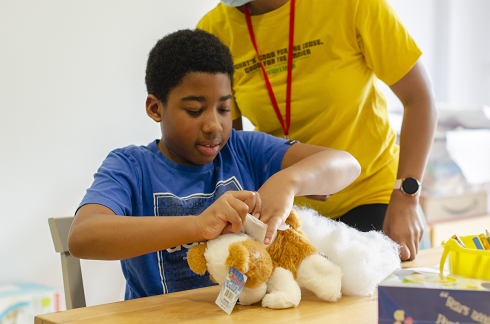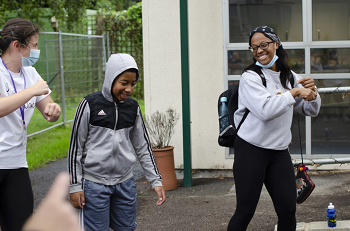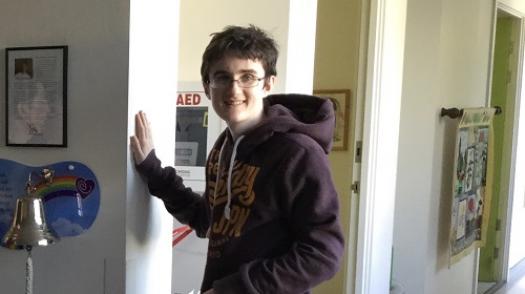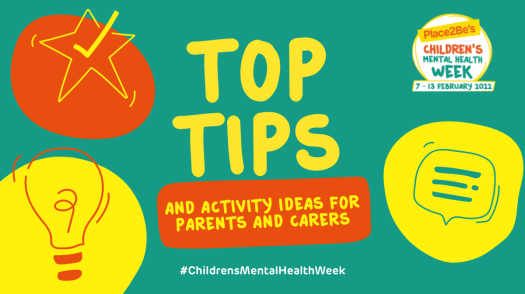Published: July 2022 Date of brain injury: April 2021 (aged 10 years old)
We were at home that morning and Aaron was outside playing football. He came inside complaining of a headache and then started vomiting. Afterwards he became unconscious.
Aaron was admitted to the Paediatric Intensive Care Unit (PICU) at Birmingham Children’s Hospital where he was treated for an arteriovenous malformation (AVM) in his brain – an abnormal tangle of blood vessels. Aaron was also diagnosed with a spontaneous intracranial haemorrhage.
It all happened so quickly, and we were worried for Aaron’s life. We didn’t know what was going to happen next.
After 10 days Aaron was discharged to the ward from the PICU where he began to receive support from the hospital’s therapy team. Once Aaron was stable and had started to make progress, one of his consultant’s told us about rehabilitation options at The Children’s Trust and made a referral.
Specialised rehabilitation
Almost three months after Aaron was first admitted, we were transferred from the hospital to The Children’s Trust in Tadworth, Surrey. When we first arrived, I just remember feeling incredibly eager to get started with Aaron’s therapy sessions and see how he could continue to progress.
Aaron stayed in Maple house and felt very happy and safe in his room. He also loved playing the table football!
It was like a home away from home in Tadworth. The Children’s Trust ensured that Aaron had access to regular physiotherapy and occupational therapy sessions.
Aaron really looked forward to his time on the treadmill during his physiotherapy sessions. He even started to challenge himself to see if he could get the longest time on the whiteboard for walking on the treadmill that week.
Another favourite for Aaron were the play sessions. He (we) absolutely loved them, especially the game pigs in pants which brought lots of fun and joy to even the most difficult of days.
And it wasn’t only the more physical rehabilitation, but he also received much needed psychology input that I now know he would have struggled to get under community care at such frequent intervals.
Brain Injury Education with a Specialist Educational Psychologist
“When Aaron arrived in his Psychology sessions, he was self-aware, motivated, and able to ask questions about his brain and brain injury,” said Dr Isabelle Sharples, Specialist Educational Psychologist at The Children’s Trust. “Natalie was always by his side with unrelenting encouragement.
“Together we completed Brain Injury Education sessions which explained a bit about the brain, how rehab works, and Aaron’s injury. They helped the family understand the impact of Aaron’s brain injury on his sense of self, his ability to understand and manage his feelings, and his impulsivity.
“We explored lots of topics and problem-solving methods – alongside playing games of Connect4 which Aaron always won! We used scaling to explore thoughts and feelings. What Aaron thought about the future, what he was looking forward to, and what he was worried about. We spent time thinking about Aaron’s life up to now, his close relationships with his family, things they together and how this will continue despite his injury.
“It was wonderful to share in such joyful moments when Natalie and Aaron would share stories with each other which led to laughter. Aaron’s sharp sense of humour and excellent cognitive skills helped him engage in every session and it was a pleasure to work with him.”
Going home and adjusting to living with a brain injury
In September 2021 we left The Children’s Trust and came home. It was good to be back home full time after months of being away, but there was definitely a settling in period for both Aaron and the rest of the family as we adjusted to living with his ongoing challenges.
We missed the regular physiotherapy and occupational therapy input Aaron had in Tadworth as the community-based alternatives are just not the same. However, Aaron hasn’t let that stop him. He has done really well, improving his walking and his writing. He swims regularly now as well and enjoys playing disability football.
When I ask him how he is doing he says fine, but to be honest I don’t know. Some days I do wonder if he really is, but as a parent I guess I will always worry about him. I’m so proud of him and inspired by his continued determination.
I am very grateful for Aaron's opportunity to go to The Children's Trust, and I know that the time we spent there has helped immensely in Aaron's recovery. My hope for the future would be for there to be more places like it across the UK to deliver not just initial intensive therapy but ongoing therapy for children.





